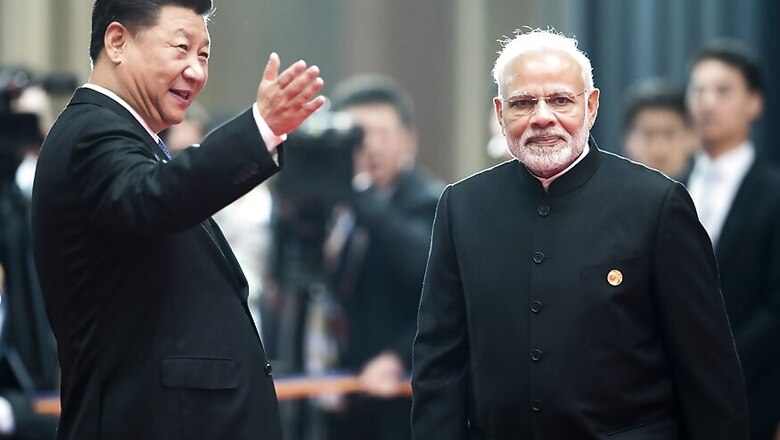
views
New Delhi: India on Sunday refused to endorse Chinese President Xi Jinping’s pet One Belt, One Road (OBOR) project as part of a joint declaration at the 18th SCO summit in Qingdao — the only member in the eight-nation bloc to do so — asserting that New Delhi would support initiatives that ensure inclusivity.
In an address at the Shanghai Cooperation Organisation (SCO) summit, Prime Minister Narendra Modi said mega connectivity projects must respect sovereignty and territorial integrity of countries.
The Prime Minister also coined an acronym — SECURE — which he explained as ‘S’ for security for citizens, ‘E’ for economic development, ‘C’ for connectivity in the region, ‘U’ for unity, ‘R’ for respect of sovereignty and integrity and ‘E’ for environment protection.
Referring to the threat of terrorism, Modi talked about the “unfortunate” example of the effects of terrorism and extremism in Afghanistan and hoped that the bold steps taken by its President Ashraf Ghani will be respected by all the players in the region.
It was the responsibility of the bloc to ensure that the reasons for which Afghanistan’s unity, integrity and sovereignty were affected in the past are not repeated, he said, adding India will play an important role in the SCO Contact group on Afghanistan.
Officials said almost all SCO leaders, including Russian President Vladimir Putin and Chinese President Xi Jinping, talked about the dangers of terrorism and extremism and resolved to contain it with a concrete action plan.
Talking about the importance of transport corridors, Modi, in the presence of Xi, said India’s commitment to connectivity projects is reflected in its involvement in International North South Corridor project, development of the Chabahar port and Ashgabat agreement.
“Connectivity with the neighbouring countries is India’s priority. We welcome the connectivity projects which are sustainable and efficient and which respect territorial integrity and sovereignty of the countries,” he said.
India has been severely critical of the Belt and Road Initiative (BRI), Xi’s pet project, as the $50 billion China Pakistan Economic Corridor, which is part of the BRI, passes through Pakistan-occupied Kashmir (PoK).
India says it cannot accept a project that ignores its core concern on sovereignty and territorial integrity.
Except India, all other member nations of the SCO including Russia, Pakistan and Iran have been supporting China's BRI.
Modi also said the history of the region carries a clear message that connectivity does not only mean physical connectivity and that the human aspect relating to it is also important.
He said priority for people-to-people contact and exchange of ideas should be given due priority. He added that India welcomes the concept of “open doors”.
The International NorthSouth Transport Corridor (INSTC) is a 7,200-km-long multi-mode transport project for moving freight among India, Iran, Afghanistan, Armenia, Azerbaijan, Russia, Central Asia and Europe.
The Ashgabat agreement is a transport agreement among several Gulf and Central Asian countries which is aimed at creating a transit corridor to spur trade and investment. India has been supporting the project.
“We have again reached a stage where physical and digital connectivity is changing the definition of geography. Therefore, connectivity with our neighbourhood and in the SCO region is our priority,” Modi said.
In his address, Pakistani President Mamnoon Hussain whole-heartedly supported the BRI and said the China-Pakistan Economic Corridor (CPEC), which is part of the BRI, has boosted Pakistan's economy.
It is for the first time the Indian prime minister attended the SCO summit after India along with Pakistan became full-fledged members of the grouping, jointly dominated by China and Russia.
The officials said India wants stabilisation of the energy market and the issue figured during deliberations at the summit.
The SCO currently has eight member countries which represent around 42 percent of the world's population and 20 percent of the global GDP.
Modi said India would like to extend all cooperation to the SCO and that the bloc gives India immense opportunities to enhance friendship with resource-rich Central Asian nations.
He also suggested that the SCO members should set some goals and form a small committee to prepare a roadmap to achieve them by the bloc's 25th summit.
He also announced that India will host an SCO food festival and a comprehensive exhibition on Buddhist heritage.
Modi also complimented China's initiative to organise an SCO film festival and SCO world heritage exhibition.
In his address, the Chinese President announced offering a 30 billion yuan ($4.7 billion) loan to SCO for joint projects.
The SCO was founded at a summit in Shanghai in 2001 by the presidents of Russia, China, Kyrgyz Republic, Kazakhstan, Tajikistan and Uzbekistan. India and Pakistan became its members last year.
















Comments
0 comment